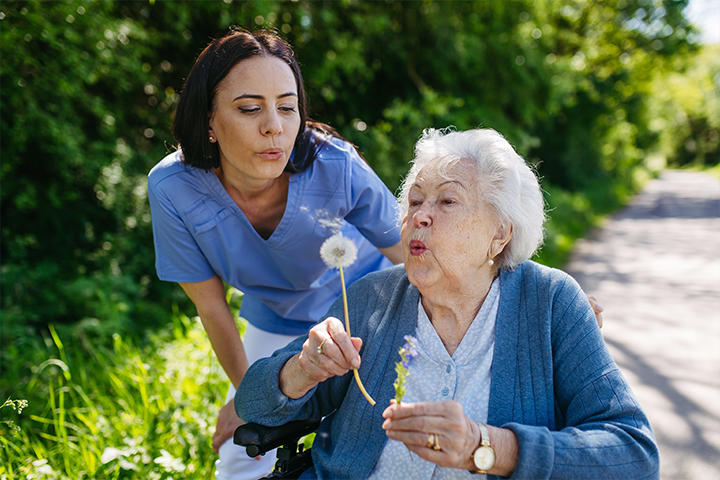As you age, some memory loss is typical. But when is it something to look into? It’s important to highlight the difference between normal age-related memory issues and dementia and Alzheimer’s disease.
Age-related cognitive decline can include things like:
having a hard time remembering names
misplacing objects
being unable to come up with the right word and remembering it later
On the other hand, Alzheimer's disease is a brain disorder. It’s the most common form of dementia.

Brain disorders aren’t a normal part of aging. They affect the brain and body differently than everyday forgetfulness. How can you tell the difference? It’s important to pay attention to whether forgetfulness is having a major impact on your daily life. This includes things like feeding yourself, managing your money, taking your medications and driving to shop for groceries.
People with memory loss or other signs of Alzheimer's disease may not know they have a problem. Family or friends may spot the signs first. Here’s what to look for:
memory loss that disrupts your daily life
difficulty completing familiar tasks
confusion with time or place
trouble understanding visual images
new problems with words or speaking
changes in mood or personality
Foggy thinking or memory lapses don't mean you have a brain disease. Sleep apnea, vitamin deficiencies and even depression may be the cause.
These five simple steps could improve brain health, reduce risk of disease and help delay the potential onset of Alzheimer's disease or dementia.
Use it or lose it. Whether it's crossword puzzles, reading or painting, keeping your brain mentally stimulated may help keep it young.
Get enough sleep. Sleep deprivation can lead to problems with memory and cognitive abilities. Sleep is essential for brain maintenance, like removing built-up toxins in your brain.
Stay social. Isolation and loneliness in older adults can lead to memory issues. Spending time with friends and family and doing things that get you out in the world can help your brain!
Get moving and eat a healthy diet. Studies show moderate exercise can help improve brain function, especially in areas responsible for learning and memory. Improving these parts of the brain may fight pre-Alzheimer's changes often seen in midlife. Other lifestyle choices, like eating a healthy diet, may also help reduce risk of heart damage while helping to slow brain aging.
Reduce stress. Stress can impact your mental health and your brain health, so try to reduce your stress as best you can. Meditating, taking walks and finding things you enjoy doing can combat stress and help your brain function better.
It's important to remember every case of Alzheimer’s and dementia is different, and there are different things you can do to care for your loved one or help others care for you. People with dementia-like symptoms should see a doctor as soon as possible.

Caring for Someone with Alzheimer’s or Dementia
Taking care of someone with dementia or Alzheimer’s can be a challenge, but there are ways to manage. Some tips on helping your loved one with everyday tasks include:
Keep a routine: Do your best to stick to a routine every day for things like bathing, dressing and eating to help them become an essential part of their schedule daily.
Plan activities: Choose activities the person enjoys and try to do them often at the same time in the day. Whether it’s puzzles or a fun outing, incorporating activities can keep your loved one active and everyone’s mind sharp.
Reassure the person: Speak calmly and tell them you understand their feelings of frustration, anger or sadness. Help them understand what’s happening to them is not their fault.
Support them through modifications: Whether it’s loose-fitting clothing or a shower chair, help them adjust to changes in their lifestyle with ease by helping them change their habits to make things easier, while still keeping some independence.
Resources for TRS-ActiveCare and TRS-Care
Provider Finder®
If you or your loved one think you need to be tested for dementia or Alzheimer’s or have questions about changes in your behavior, you can use Provider Finder® to find a neurologist or Alzheimer’s specialist to answer any questions and concerns you may have.
Resources TRS-Care Medicare Advantage
Let’s Move by UnitedHealthcare
Let's Move by UnitedHealthcare is here to help keep your mind, body and social life active – at no additional cost to you. With simple resources, tools, events and personalized support, Let’s Move helps you explore ways to eat well, stay connected and be financially, physically and mentally fit — all at no additional cost to you.
To explore, visit Letsmovebyuhc.com through your member website.
You can also participate in live, virtual events to learn how to cook healthy meals, be physically active, and explore other wellness topics by visiting the events page.
Mental and behavioral health resources
Ongoing mental health support with Optum® Behavioral Health
Resources through our Health and Wellness experience
To learn more, call 1-866-347-9507, TTY 711, 7 a.m.-6 p.m. local time, Monday-Friday or visit Health & Wellness on your member website.